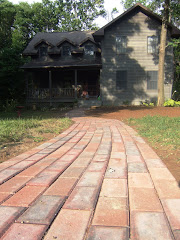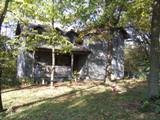S and I will soon sit down to review our plans, anticipated start-up costs, and other details to get our farm up and running. We try to do this once to twice a year to make sure we are still on track, and to make any necessary changes and adjustments to the plan, as we are always learning more. So for all of you more experienced homesteaders and self-sufficiency "experts" out there, we could use a little advice.
Our current "final" plan is to have horses, a cow for milk and to breed for beef, possibly some goats for goat-milk soap and land clearing, a hog or two for tilling and pork, chickens for meat and eggs, a vegetable garden, a salad/kitchen garden, and a fruit orchard. Because I am already very familiar with horses and chickens, we are planning to acquire those immediately upon moving in. But after that, we will pretty much be learning as we go. What order of importance do you recommend? We have our ideas, but I am really curious to hear from those of you who have been through it. Or if you had it to do all over again, whether you would change anything? Also, regarding major acquisitions such as animals and crops, is there anything ELSE you would recommend?
Thanks in advance! Just leave me a comment with your recommendations!
10 years ago


.jpg)

3 comments:
I don't know if I'd call me experienced, but as we're a little ahead of you, I'll answer. I've learned that the learning curve on each animal seems to get steeper, the bigger the animal is. Our cow has been much harder to learn than our goats. Our pigs were probably on the easy end, though it took a while for us to appreciate their strength and thus build a suitable fence. Goats are known to be escape artists, but we haven't had much trouble with them at all. And frankly, if I mess up and a goat dies, our investment is so much smaller than if I mess up and our cow dies. Hope that doesn't sound cruel.
So, I would say to get yourselves set up with the horses and chickens and plant that orchard too, since it takes so long to produce. I know you said you have experience with chickens, but I don't know if that means that you know both meat and egg chickens and their various housing, etc. Though chickens are pretty easy, it takes some time to figure out what sorts of tractors, coops, etc, that you might want to use. And, if you have a nice-sized laying flock and add 100 broilers or so, you might be surprised at how MUCH that actually is to do.
Then, TAKE YOUR TIME. I know that the desire to jump into the next thing is forceful, but try to pace yourselves. This was our biggest mistake. I'd probably then do pigs and a garden the second year, as you can have the pigs root up the garden area for you. Then, add the milk goats the third year. And finally the cattle. And, by the way, dairy cattle are much more complicated and sensitive than beef cattle.
Of course, a lot depends on your priorities. If you hope to really get a good beef herd going, you may want to rearrange the order of things. But, again, my advice would still be to pace yourself. I'd plan on taking SEVERAL years to acquire all that you want. Yes, that may mean getting your milk from someone else for a while or buying a side of beef from outside, but it'll be worth it to not bite of more than you can chew.
Oh, and have you considered rabbits? They are very easy to handle and house, reproduce easily, and the meat is much like chicken. It takes some mental focus to get past the whole "eating a cute little furry bunny" thing, but once you get your arms all scratched up by a protective mother, you won't have as hard a time! :) Anyway, they can hang up in a barn or chicken coop (over dirt floor) in cages in the winter and then you can put them in cages on the grass in the summer and move them daily. They aren't nearly as sensitive as some of the books make them out to be. Ours are outside on grass from about April to October and don't have any problems with heat, rain, etc. They do have some shade, but they are pretty hardy creatures.
And then, you'll probably want to eventually get a few turkeys, maybe some ducks, some guineas, maybe some sheep...
There is so much to do!!!
Thanks for the input! Some of what you said is totally different that what was "making sense" on paper (i.e. hogs before cow)! As far as chickens, I am semi-familiar with both, have raised them in the past, and have researched and planned for both a coop for the layers and tractors for the broiler/fryers. We have actually considered rabbits, as I also raised those in the past (breeders). We just haven't been able to come up with enough "inputs" from the rabbit to make the "output" worthwhile. We will definitely consider these suggestions! Thanks again!
I agree totally with Gina, even tho we, too, jumped in with both feet at our farmstead. We did have lots of experience with each of our animals (horses, chickens, beef cows, goats, pigs), but the farm wasn't set up for them. So there were lots of fences and buildings to build which took a lot of time to try to keep ahead of the hungry animals eating their current pastures down.
An easy way to start with cows would be to raise a calf on milk (goats milk is great) or milk replacer. As Gina said, your investment is not so high, and the animal is not so big to start with. You would be raising your own beef, and could have milk for the family from the goats. There is still lots to learn about raising a calf, but again they are cheaper to replace (oh, you do start to get hardened after being a farm wife:). After some experience of raising calves it would be an easier transition to move to that very large milk cow.
Planting the orchard first is a great idea. We have been here over 2 years and I wish I would have done it immediately. We could be looking at harvesting berries, etc, rather than just now hoping to plant them. Gardens can start small, too. We were happy with enough to supplement our table the first summer, then expanded with last years garden to be able to freeze and can a substantial amount (again something I had done before so it was not sooo overwhelming to have 7 rows of beans). This year we will expand again to add more of the plants we experimented with last year.
Our goal has been that the animals would somehow sustain themselves financially. Not that we have totally gotten there, yet, but an income of some sorts is a good idea to implement in each type of animal. For instance, we raise 3 calves rather than one, which about pay for the costs of hay and grain when butchered, and they also grow much better with the competition for eating. We get our beef for nearly free in the end, if all goes well. Same with chickens, you could plan to have enough to sell eggs, or better yet, incubate the eggs all spring and sell the chicks (or even pullets or processed meat) and make enough chicken food money for the whole year. Goats you could raise the does and sell yearling milking does every spring. The horses we have not figured out a way for them to earn their keep:) Their just kept because their loved! Again, start small, and learn as you go.
Put some thought into how you want your fences set up. A dry lot, birthing pasture, rotating pastures, loading chute, joined fences which share a common self watering tank, gate access (preferably two per pasture for those escape artist who are never near the front gate).
If you have enough land it is usually pretty easy to find a local farmer who would be interested in crop sharing. You get a fraction of the crop off of your land, in exchange for the farmer supplying the seed and work. Giving you food for your animals at a fraction of the cost, and bettering your land, as well.
Don't go into debt to attain it. You will find yourselves working extra at your jobs just to sustain your farm and critters, and it will rob alot of the joy of working at your dream.
Above all, love what you are doing, and it will never be a job. It brings me great joy to be out with the animals and gardens, and to dream and plan for our homestead. The extras of good food, and a wonderful childhood for our children is a bonus.
Post a Comment